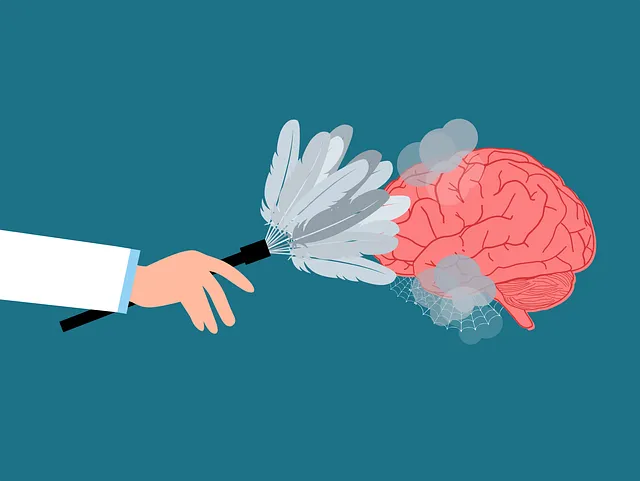Littleton Kaiser Permanente's collaborative approach to understanding and addressing mental health needs through tailored solutions, data-driven insights, and public awareness campaigns is a powerful strategy for enhancing community mental wellness. Their Mental Health Awareness campaign leverages podcasts, digital media, and traditional channels to educate, dispel myths, reduce stigma, and promote accessible resources. By integrating comprehensive mental health coverage and evidence-based practices like Emotional Intelligence and Conflict Resolution Techniques, they empower individuals, foster resilience, and ensure immediate support for those in need. Evaluating the success of these initiatives through surveys, interviews, and observational studies drives continuous improvement and meaningful positive transformations within communities.
Public awareness campaigns play a pivotal role in shaping societal attitudes towards mental health, with organizations like Littleton Kaiser Permanente recognizing their impact. This article explores strategies for developing impactful initiatives, focusing on understanding community needs through examining mental health coverage gaps. We delve into designing engaging campaigns, integrating care access, and utilizing digital and traditional media to maximize reach. Additionally, we discuss measuring success to ensure these efforts resonate and drive positive change in mental healthcare accessibility.
- Understanding Mental Health Coverage Needs in Communities
- Designing Effective Public Awareness Campaigns for Mental Health
- Incorporating Access to Care and Support Services in Campaign Strategies
- Leveraging Digital Platforms and Traditional Media for Maximum Reach
- Measuring Success and Impact of Mental Health Awareness Initiatives
Understanding Mental Health Coverage Needs in Communities

In many communities, understanding mental health coverage needs is a critical step towards enhancing mental wellness. Organizations like Littleton Kaiser Permanente play a pivotal role in gauging and addressing these needs. Through collaborative efforts with local stakeholders, they can identify gaps in existing services and resources, ensuring that tailored solutions are developed to support the unique challenges faced by diverse communities. This process involves extensive research, community engagement, and data analysis to pinpoint specific areas requiring attention, such as increased access to therapy or reduced mental illness stigma.
The Mental Health Awareness campaign can effectively utilize the Mental Wellness Podcast Series Production to reach a broader audience. By creating informative and engaging podcasts, these initiatives can educate folks about various mental health topics, dispel myths surrounding mental illness, and encourage open conversations. Such platforms provide an accessible way to promote understanding, foster empathy, and ultimately reduce the stigma associated with seeking help for mental health concerns.
Designing Effective Public Awareness Campaigns for Mental Health

Designing effective public awareness campaigns for mental health requires a nuanced approach that caters to diverse audiences. According to Littleton Kaiser Permanente’s mental health coverage, initiatives should focus on destigmatizing mental illness while promoting accessible resources and support systems. Incorporating evidence-based practices such as Emotional Intelligence (EI) and Conflict Resolution Techniques (CRTs) can significantly enhance campaign impact. By teaching EI skills, campaigns can empower individuals to better understand and manage their emotions, fostering a sense of resilience and self-care.
Additionally, integrating Stress Reduction Methods (SRMs) into awareness programs can help alleviate common mental health challenges. Simple yet effective SRM techniques, like mindfulness meditation and deep breathing exercises, are easily adaptable for various settings, from community gatherings to online platforms. Such inclusive strategies ensure that campaigns resonate with a broad spectrum of individuals, ultimately leading to improved mental well-being within communities.
Incorporating Access to Care and Support Services in Campaign Strategies

Incorporating access to care and support services into public awareness campaign strategies is paramount in addressing mental health challenges, especially within specific communities. For instance, organizations like Littleton Kaiser Permanente have recognized the importance of comprehensive mental health coverage, integrating it as a core component of their initiatives. By doing so, they aim to destigmatize seeking help and ensure that individuals who may be at risk of burnout or experiencing crises have readily available resources. This approach is vital in reaching a broader audience, especially healthcare providers, who often face the brunt of burnout prevention strategies.
Effective campaigns can leverage crisis intervention guidance and social skills training as powerful tools. These programs empower individuals to recognize signs of mental health issues, provide coping mechanisms, and offer platforms for support networks. By intertwining such services within awareness campaigns, there is a potential to create a more resilient community where members not only understand the value of mental well-being but also have access to immediate assistance when needed.
Leveraging Digital Platforms and Traditional Media for Maximum Reach

In today’s digital era, leveraging various media channels is pivotal for successful public awareness campaigns. Digital platforms offer unprecedented reach and engagement opportunities, especially when targeting younger demographics. Social media, online forums, and dedicated websites can effectively disseminate information about essential topics like mental health coverage, such as that provided by Littleton Kaiser Permanente. By creating compelling content and utilizing targeted advertising, organizations can ensure their messages resonate with the intended audience.
However, traditional media still holds significant power in reaching diverse communities. Local news outlets, radio shows, and community events provide a personal touch and build trust among residents. Combining both digital and traditional approaches allows for maximum exposure and engagement. For instance, a campaign promoting emotional intelligence and empathy-building strategies could utilize online resources to share educational videos while also partnering with local media to air public service announcements, ensuring the message is far-reaching and impactful, and encouraging the development of coping skills.
Measuring Success and Impact of Mental Health Awareness Initiatives

Evaluating the success and impact of mental health awareness initiatives is paramount to understanding their effectiveness in fostering positive change. Measuring success goes beyond simple exposure; it involves assessing behavioral shifts, increased knowledge, and reduced stigma associated with mental illness. Organizations like Littleton Kaiser Permanente have led the way by integrating comprehensive mental health coverage into their services, providing a foundation for these assessments.
Through surveys, interviews, and observational studies, researchers can gauge changes in attitudes and behaviors before and after campaigns. The Risk Assessment for Mental Health Professionals, for instance, helps identify potential risks and barriers faced by healthcare providers, allowing for tailored interventions to enhance cultural competency training (as seen in initiatives like Healthcare Provider Cultural Competency Training). Similarly, Mental Illness Stigma Reduction Efforts focus on measuring changes in public perceptions to ensure that awareness campaigns are indeed driving positive transformations.
Public awareness campaigns play a pivotal role in shaping community understanding and access to mental health services. By addressing specific needs, as demonstrated by the Littleton Kaiser Permanente mental health coverage model, we can design effective strategies that incorporate digital platforms and traditional media. Measuring success through established metrics ensures these initiatives resonate and make a tangible impact on individuals’ lives, fostering a more supportive and informed society.






